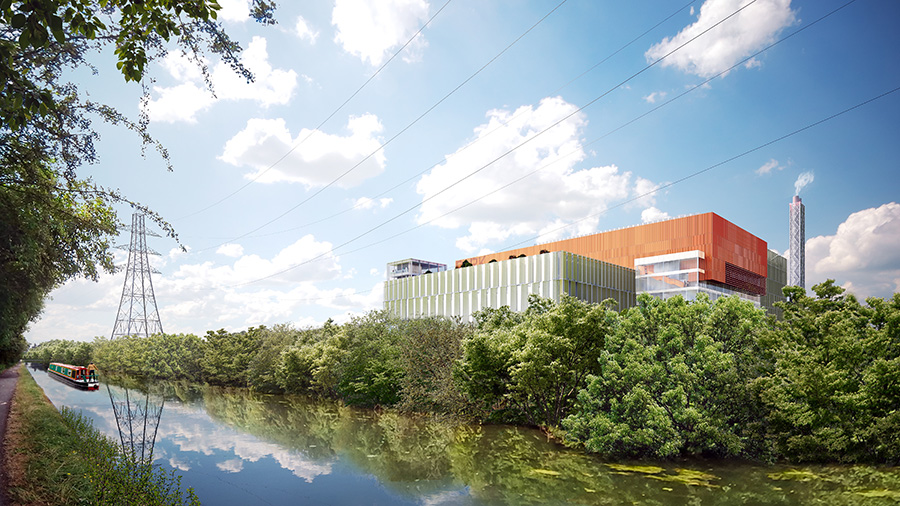Report confirms Edmonton’s new waste hub is a crucial investment in green jobs and infrastructure
As the Edmonton Energy from Waste (EfW) facility nears the end of its life, the future is looking greener for north London resident’s non-recyclable waste. The commitment to ‘build back better’ with a world-class Energy Recovery Facility (ERF) fits right alongside the calls of 13 cross-party politicians to keep driving up recycling, reducing waste to landfill and maximising the heat off-take of energy from waste facilities.
The new report, No Time to Waste, released by Policy Connect and signed by the politicians has reemphasised the need for more developments in the waste sector that reflect the same ambitious goals that North London Waste Authority’s (NLWA) Energy Recovery Facility is being built on to transition to Net-Zero. The facility will stop up to 700,000 tonnes of north London’s non-recyclable waste being sent to landfill or third-party facilities each year.
It is clear from the report that there needs to be less waste buried in landfill or processed and exported to other countries for energy recovery where the UK economy cannot reap the energy or financial benefits. It also recognises EfW facilities that produce heat as well as electricity, in line with the Scandinavian approach and the new Edmonton ERF, as the most efficient way of treating residual waste.
Evidence is given to how EfW is compatible with the Circular Economy whilst upholding the primary focus on waste prevention and also states: ‘There are often claims that EfW inhibits recycling rates, however this inquiry found no evidence to support this.’
A new, state of the art, Resource Recovery Facility, which will sit on the same site as the ERF, will manage 135,000 tonnes of recyclable material every year and is part of NLWA’s efforts to drive up recycling rates in north London up to 50%. The report also notes that countries which rely on EfW rather than landfill ‘often provide evidence that EfW goes hand in hand with the best recycling performances.’
Cllr Clyde Loakes, Chair of NLWA says; “NLWA is proud to be part of the transition to Net-Zero with a facility which will perform a vital task for the 2 million residents of north London. We completely agree that more must be done to drive up recycling rates and our North London Heat and Power Project (NLHPP) provides essential facilities that will help us in our mission to achieve this. We are building flagship recycling facilities and increasing the opportunities for residents to bring their items for reuse and recycling, putting the NLWA at the forefront of the UK’s response to increasing recycling, as well as a world-class ERF to speed north London towards a low carbon future.”
Not only does the scheme provide a public reuse and recycling centre on the site for the first time ever, it also unlocks the potential to heat thousands of local homes and businesses in Edmonton. This is another key theme in the Policy Connect report that highlights the need to maximise the heat off-take by building EfWs in residential areas - where waste heat from the combustion process can provide low-carbon alternatives to traditional heat production methods. This is an essential part of decarbonising the energy mix as the UK move towards Net-Zero.
The Policy Connect report states: ‘Our inquiry concludes that EfW has an important role to play in the transition ahead of us: both as the lowest carbon solution for managing residual waste, but also by providing low carbon heat and supporting other sectors’ decarbonisation efforts.’
Other misconceptions around the risk EfWs could pose on health and air quality are quickly debunked as unproven, citing ‘It has become commonplace to dismiss EfW as dangerous and associate it with claims of health risks, despite no evidence to support this. What is less frequently recognised is the basic but fundamental service in maintaining hygiene that EfW first and foremost provides.’
The NLHPPs own ERF will be fitted with the highest class of proven technology for controlling emissions, which will ensure the facility is one of the safest and cleanest in the world. The ERF will be the first in the country to use Selective Catalytic Reduction, which is the same proven technology used in the Amager Bakke facility in Copenhagen – often pointed to as a global benchmark for emissions cleaning.
The ERF procurement has opened last week for contractors interested in bidding for the £683m contract and more information is available for contractors at northlonondheatandpower.london/suppliers
